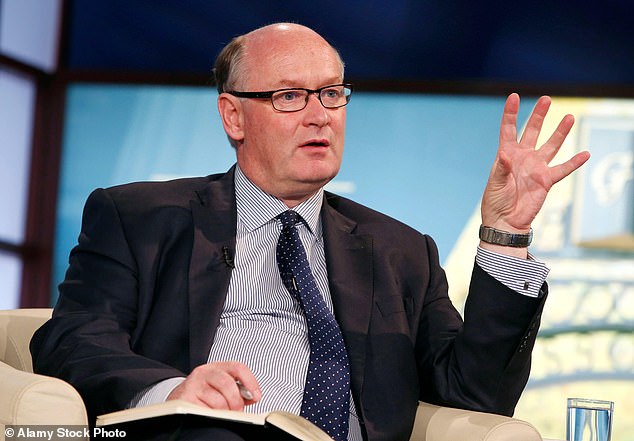City bosses tell Chancellor: Our investment is being crippled by the EU’s £7 billion austerity bomb
- The most respected figures from the financial world among those who signed the letter to Jeremy Hunt
- They claim that regulations are causing Britain to lose out on a fortune every year
- Controversial rules are being applied to British investment trusts – despite Brexit
The city’s bosses have written to the Chancellor this week demanding he scrap the European Union’s bizarre rules that are hurting savers.
Sir Douglas Flint, chairman of investment firm Abrdn and one of the most respected figures in the financial world, is one of more than 130 money managers to sign the letter to Jeremy Hunt.
They claim that the controversial EU regulations are causing Britain to miss out on £7 billion of money every year that could be put into green energy, repairing roads, railways and building hospitals.
The controversial rules are applied to British investment trusts – despite Brexit.
Trusts have a long history in Britain dating back to the Victorian era, when they financed railways and other engineering projects. Trusts continue that tradition today by investing in areas such as renewable energy, transport and other infrastructure.
Looking for a new dawn: the controversial rules are being applied to British investment trusts – despite Brexit

Sir Douglas Flint, chairman of investment firm Abrdn and one of the most respected figures in the financial world, is one of more than 130 money managers to sign the letter to Jeremy Hunt.
There are 361 investment trusts in the stock market. Together they manage £267 billion in assets.
Flint and his fellow directors argue that the trusts are at risk because of rules that give the impression that the costs of investing are much higher than is actually the case.
Flint, the former chairman of banking giant HSBC, told The Mail on Sunday that the rules were “a barrier to getting money for the infrastructure we desperately need”.
He added: ‘We need to make it attractive to invest in Britain and ensure people can finance infrastructure through their pension plans.’
Justin Dowley, chairman of FTSE 100-listed Scottish Mortgage Investment Trust, also wants Hunt to take action as investment trusts are subject to rules devised by the EU. Despite Britain voting to leave the EU – meaning there is no need to apply them at all – the city’s watchdog, the Financial Conduct Authority (FCA), is imposing them on companies in a draconian way.
As a result, trusts find themselves in a bizarre situation where many of their costs are double-counted. Campaigners say this situation is unique to Britain.
It has led to a sell-off of mutual funds, leaving them out of cash and vulnerable to foreign takeovers as many of their share prices have fallen. In their letter published this weekend, city bosses warn Hunt that the rules are ‘cutting off’ vital funding.
Campaigners say the regulations threaten to choke off the flow of money to areas the Chancellor hopes to boost, such as renewable energy, science and biotechnology.
The letter states: ‘This is having a negative impact on investment in Britain and is driving UK investors’ capital into companies listed abroad, contributing to the poor performance of the UK stock market. This certainly cannot continue. The British interpretation is flawed. If we solve the problem by doing what the rest of the world is doing, it could restore more than £7 billion a year in lost investment – at no cost to the taxpayer.”
It continues: ‘We call on the government and the Financial Conduct Authority to take action now to end this situation immediately and return Britain to a competitive position.’

More than 130 money managers have signed a letter to Jeremy Hunt demanding he scrap the European Union’s bizarre rules that are hurting savers
The campaign is backed by AJ Bell, one of Britain’s largest investment platforms.
Senior politicians, including former pensions minister Baroness Altmann, also want a review.
Altmann, along with other colleagues including Lib Dem Baroness Bowles and Labour’s Lord Davies of Brixton, are trying to push legislation through Parliament that would remove investment funds from these rules.
A Treasury spokesperson said: ‘We recognize the industry’s concerns and are working at pace with the FCA to reform the UK’s retail disclosure regime, including for investment trusts. We will provide more details on these reforms shortly.”
